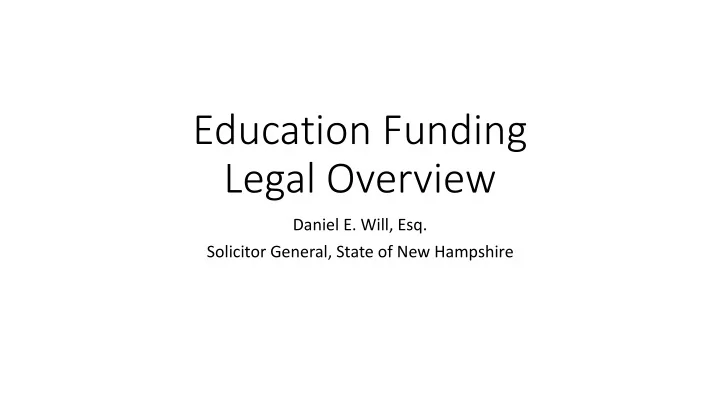

Education Funding Legal Overview Daniel E. Will, Esq. Solicitor General, State of New Hampshire
New Hampshire Constitution Part II, Article 83 • Title : Encouragement of Literature, etc. • Text : • Knowledge and learning, generally diffused through a community, being essential to the preservation of a free government; and spreading the opportunities and advantages of education through the various parts of the country, being highly conducive to promote this end; it shall be the duty of the legislators and magistrates, in all future periods of this government, to cherish the interest of literature and the sciences, and all seminaries and public schools, to encourage private and public institutions, rewards, and immunities for the promotion of agriculture, arts, sciences, commerce, trades, manufactures, and natural history of the country; to countenance and inculcate the principles of humanity and general benevolence, public and private charity, industry, economy, honesty and punctuality, sincerity, sobriety, and all social affections, and generous sentiments among the people . . . .
Part II, Art. 83 – Key Language • “it shall be the duty of the legislators and magistrates, in all future periods of this government, to cherish the interest of literature and the sciences, and all seminaries and public schools, to encourage private and public institutions . . . .”
Claremont v. Governor , 138 N.H. 183 (1993) ( Claremont I ) • Plaintiffs : Five “property poor” school districts, five school children, and five taxpayers. • Claims : Education system violates Part II, Art. 83. Focused primarily on financing mechanisms, both capped state aid (8%) and property taxes. • Trial Court : Dismissed the suit because, in court’s view, plaintiffs did not state a viable claim.
Claremont I – NH Supreme Court Holding • Part II, Art. 83 “shall be the duty . . . to cherish” is a Mandate • “The language commands in no uncertain terms, that the State provide an education to all of its citizens and that it support all public schools.” (at 187) • State’s Obligation Alone • “While it is clearly within the power of the State to delegate some of the implementation of the duty to local governments, such power does not include a right to abdicate the obligation imposed by the Constitution.” (at 191) • Legislature Must Define • “We do not define the parameters of the education mandated by the Constitution as that task is, in the first instance, for the legislature and the governor.” (at 192)
Claremont I - Reasoning • What did the words in Part II, Art. 83 mean when adopted? • What were circumstances at the time Part II, Art. 83 was adopted? • What have other courts said about similar provisions in other states?
Claremont v. Governor , 142 N.H. 462 (1997) ( Claremont II) • Back to NH Supreme Court after Claremont I remand/trial • Issue: is funding through property taxes constitutional? • Implicates Part II, Article 5. • Taxes must be proportional and reasonable. • Issue: what kind of right and what level of scrutiny?
Claremont II – Part II, Art. 5 • Holding : property tax funded system violates Part II, Article 5 – it is not proportional nor reasonable. • Property tax to fund education is not proportional: • State-wide tax, since funds state level obligation. • Differing rates mean different citizens pay different amounts • Property tax to fund education is not reasonable: • Reasonable means just; not just to tax toward state level obligation at differing rates by town.
Claremont II Holding – Nature of the Right • Holding : right to adequate education is a “fundamental right.” • Therefore, “strict scrutiny” applies to deprivations of the right. • Compelling state interest must narrowly justify the government’s conduct. • What does “adequate education” mean definitionally? • More than “reading, writing, and arithmetic” • Broad educational opportunities to prepare citizens for their role as participants and potential competitors in today’s marketplace of ideas. • Within broad parameters, Legislature must define.
Claremont II – Role of Local Participation • The right to an adequate education is not the right to “horizontal resource replication” – meaning it does not require all schools to be the same. (at 474) • Local control plays a valuable role in public education but State cannot use local control as justification for allowing the existence of educational services below the level of constitutional adequacy. (at 475) • Local governments may be required, in part, to support public schools, but it is the responsibility of the State to devise a plan and source of funds sufficient to meet the constitutional mandate. (at 476)
Adequate Education Components • Legislature must: • Define an adequate education. • Determine the cost. • Fund an adequate education with constitutional taxes. • Ensure its delivery through accountability. ( Londonderry School District v. State, 153 N.H. 154, 155-56 (2006))
Londonderry School District v. State , 154 N.H. 153 (2006) ( Londonderry ) • At issue: definition of an adequate education. • Statute defined adequate education in broad terms • State argued went beyond constitutional adequacy • According to the New Hampshire Supreme Court, therein lay the problem.
Londonderry – Holding/Reasoning • “If the statutory scheme that is in place provides for more than constitutional adequacy, then the State has yet to isolate what parts of the scheme comprise constitutional adequacy. (at 160) • “More specifically, under the statutory scheme, there is no way a citizen or a school district in this State can determine the distinct substantive content of an adequate education.” (at 160) • “Such a system is also impervious to meaningful judicial review.” (at 160)
Recommend
More recommend